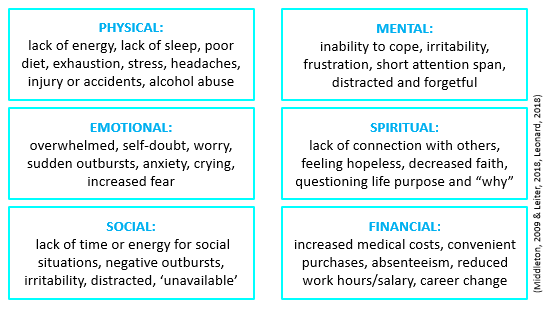This article was published in Smart Soldier 64, May 21. You can access the full edition on the DPN in the Army Lessons Online page. (Tip: Search for Army Lessons and select the second search option)
Leader burnout
By CPL Deb Herring
With the craziness of 2020 behind us, it would be nice to think that 2021 will be kinder and far less stressful than the previous year, though with the continuous requirement for training and ongoing operational tasks, 2021 will no doubt be challenging too. With that in mind, and regardless of your rank or how long you have served, ‘leader burnout’ is real threat. It affects people all over the world. The good news is that there are strategies to reduce the likelihood of burning out and to relieve symptoms of burnout, which you can easily implement into your daily routine.
What is burnout?
Burnout is described as ‘a total loss of energy and interest and an inability to function effectively, experienced as a result of excessive demands or chronic overwork’ (Leiter, 2018). Quite simply, burnout can happen to anyone at any time.
For anyone who is feeling physically, mentally and/or emotionally drained over a prolonged period of time, small tasks can seem overwhelming and little distractions can become irritating speed bumps in the daily grind. If you are finding it hard to wind down, even after adequate rest, you may be experiencing symptoms of burnout.
According to the World Health Organisation (WHO), burnout is now included on the International Classification of Diseases (ICD-11: QD85) as an ‘occupational phenomenon’ (World Health Organisation, 2021).
Although burnout can be experienced in other areas of life (not specifically in the workplace), WHO currently recognises burnout in the occupational context only (WHO, 2021).
Symptoms to look for:

Strategies to prevent burnout
Resources. In the lead up to feeling burnt out, it might be a good time to check the quality of your resources, which could be unhelpful to your wellbeing. For example; if you own a vehicle (a resource) that is unreliable and causes you stress every morning to arrive at work on time, this resource is likely to have a negative impact on your emotional and mental wellbeing. When we stop and think about the quality of our resources, we can often identify an aspect of our lives that has become ‘normal’ but is actually draining our energy. Are you using your resources effectively? Could you use online grocery shopping in your lunch break to save you time after work (resource)? Could you delegate some tasks to subordinates (resource) who can take some pressure from you? Could you do some additional learning or reading (resource) to make certain aspects of your job easier to manage? Could you spend money (resource) on a cleaner to make life easier at home? How can you be more efficient in every aspect of your life? There are many resources you can find to streamline your processes, make life easier and reduce your stress tenfold.
Adequate resources help to mitigate the impact of challenges and also increase motivation, engagement and confidence. (Bakker & Demerouti, 2007)
Planning. It may sound like an obvious strategy, but it’s also easily overlooked when life becomes overwhelming. In our haste to be overly productive and get things done, we often forget to stop for a moment and plan effectively.
We may be proactive and plan ahead in our workplace, but does this proactivity extend to other aspects of our lives where we plan ahead for vehicle maintenance, your partner’s birthday present or a much-needed weekend away to reduce stress? All of these factors can cause significant stress if overlooked and adds to the weight of our existing workload. On the other hand, some tasks may seem important at the time, but may not be as much of a priority as we first thought and could be scheduled for another time. How many days of the week feel like a blur of running around and getting things done? Can some tasks be reassessed and realistically put on hold? There is a difference between perceived impact of not achieving a task and realistic impact of not achieving a task. Effective leaders are able to manage their stress by thinking ahead, conducting a thorough needs assessment and planning accordingly.
Despite the fact that we all want to be model soldiers who are constantly striving for perfection, it is also important to create realistic milestones for yourself and others. When we continuously hold high expectations of ourselves and others, we can often feel emotionally and mentally drained. If we are able to set realistic milestones that allow for some flexibility, we are less likely to feel overworked for prolonged periods of time.
Stress is a normal part of life… Being proactive is the key to reducing stress and anxiety. Take the time to re-centre, refocus and plan ahead (Kandola, 2018 & Leonard, 2018).
Refresh. When the daily grind turns into a blur and weekends feel non-existent, it’s time to check in with yourself and refresh yourself. Although this is not something we regularly commit to as soldiers, it’s beneficial to break the cycle of prolonged stress by briefly focusing on the current status of your overall wellbeing and finding effective solutions to reduce tension. You might have to ask yourself some difficult questions – how are you really feeling today? What immediate thoughts come to mind? The quality of your diet and nutrition is also important for your wellbeing, as well as the quality of your thoughts. Anger, hatred and bitterness are draining emotions that forge a pathway to emotional burnout. It can be helpful to use some of these powerful emotions to drive performance; however, does it help to reduce your stress and make you feel good? What is the quality of your sleep and sleep patterns? If you find it hard to refresh your body and mind, you could try a number of breathing and grounding techniques to reduce the symptoms of anxiety and overwhelming before your reach the point of burnout.
Outlet. Having an outlet can be a welcome change from the daily grind that you experience during the week. An outlet can be a simple activity that helps to reduce stress and tension. It may help to refrain from some activities that actually increase anxiety and keep you awake all night (computer games) in favour of activities that restore your wellbeing and help to dissolve nervous energy (going for a brisk walk or cycling). When you are looking for a new outlet away from the military environment, consider options that tap into other areas of your brain and increase your creativity, such as; woodworking, metal work, gourmet cooking or even Lego (it’s not just for kids). An outlet is a healthy place to ‘escape’ the rat race that doesn’t involve alcohol or other unsupportive habits. When you find a supportive outlet that inspires you, you may find that it also helps to decrease loneliness, frustration and intrusive thoughts.
An outlet helps to realign and maintain your identity when multiple roles are demanding of time & energy (Kandola, 2018 & Leonard, 2018).
Grit. It is part of our job as soldiers to be mentally and emotionally tough with a high level of resilience, though it doesn’t make us bulletproof. Sometimes our limits are tested and we need to ‘dig deep’ in order to grow as professional soldiers. Gradual amounts of stress, anxiety and challenge can be healthy to break through our ‘comfort zone’ and adopt a growth mindset, which is the only way to continuously improve (Baruch-Feldman, 2017). In the unique military environment, there are many times when you just have to grit your teeth and get things done. Grit does not mean that you are dismissive or ignorant about ‘getting over it’ and running yourself into the ground, but the ability to find adequate resources and the inner strength, confidence and focus to achieve the next objective, then refresh. Every objective achieved through adversity is a chance to learn more about your limits and your ability to endure more than you probably thought you could.
Psychological resilience is defined by flexibility in response to changing situational demands, and the ability to bounce back from negative emotional experiences. (Block and Kremen, 1996).
Mindsets
Fixed mindsets. Those with fixed mindsets believe the idea that intelligence and character (resilience) cannot be developed and tend to stay in a fixed cycle (Dweck, 2008).
Growth mindsets. People who believe that intelligence and character can be developed, are more likely to push through adversity and achieve their goals (Dweck, 2008).
Helpful pathways to avoid burnout
- Identify your triggers
- Check in with yourself regularly – how am I managing my life/situation?
- Find solutions and resources to support you
- Plan ahead - realistic goal setting and prioritising
- Monitor prolonged overwork and stress
- Commit to adequate work/rest
- Positive self-talk
- Seek healthy social interactions
- Build a trusting support network
- Be open about wellbeing without fear of judgement
- Acknowledge your achievements – be humble
- Maintain exercise and a good diet
- Effective delegation and task sharing
- Laughter and knowing how to ‘let go’ in a healthy way
Unhelpful pathways that can lead to burnout
- Pressure to keep up and maintain continuous momentum
- Focusing on own insecurities and fears – chasing perfection
- Negative self-talk
- Fear of past failures, self-blame/shame or vulnerability
- Low self-confidence or self-worth
- Allowing ongoing issues to fester
- Unwilling to ‘surrender’, rest and refresh
- Self-sabotage (social jetlag, poor financial management)
- Unhealthy diet and lack of nutrition
- Procrastination / unwilling to change toxic lifestyle
Conclusion
The way we feel about ourselves and our lifestyle matters. We often feel pressure to ‘keep up’ and ‘perform’, but what is the cost to our wellbeing? If you begin to feel overwhelmed and ‘molehills’ feel like ‘mountains’, it may be time to reassess your strategy to prevent burning out. It’s more common than we would all like to admit, but you can protect yourself before it becomes problematic to your personal and professional life.









